
Manu Chao is a French-Spanish singer. He sings in French, Spanish, English, Italian, Arabic, Catalan, Galician, Portuguese, Greek, and occasionally in other languages. Chao began his musical career in Paris, busking and playing with groups such as Hot Pants and Los Carayos, which combined a variety of languages and musical styles. With friends and his brother Antoine Chao, he founded the band Mano Negra in 1987, achieving considerable success, particularly in Europe. He became a solo artist after its breakup in 1995 and since then tours regularly with his live band, Radio Bemba.
Clandestine may refer to:
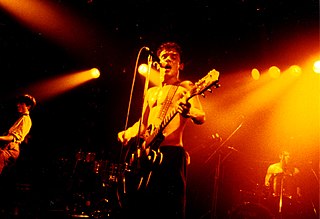
Mano Negra was a French music group active from 1987 to 1994 and fronted by Manu Chao. The group was founded in Paris by Chao, his brother Antoine and their cousin Santiago, all born of Galician and Basque parents with partly Cuban roots. Their songs were mostly in Spanish, English and French, often switching from one language to the other in the same song or in the middle of a sentence or title. They also had a hit song in Arabic. They are considered pioneers of world fusion.
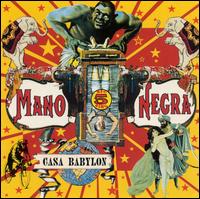
Casa Babylon is the fourth and final studio album by Mano Negra, released in 1994.

Morning Becomes Eclectic (MBE) is a three-hour adult album alternative radio program first aired in 1977 and broadcast live every weekday from KCRW in Santa Monica, California. The show's name is a play on the Eugene O'Neill trilogy of plays, Mourning Becomes Electra.
Chaos or CHAOS may refer to:
Bongo Bongo or Bongo-Bongo may refer to:
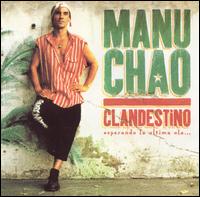
Clandestino is the first full-length solo album by Manu Chao, released in 1998. The album contains many soundbites throughout, two of which are bits of a speech by Subcomandante Marcos and, like Chao's subsequent albums, was mostly recorded by the musician himself in various locations around the world, using a small laptop—which is referred to in the liner notes as Estudio Clandestino. The French edition of Rolling Stone magazine named this album the 67th greatest French rock album. The album was also included in the book 1001 Albums You Must Hear Before You Die. The album was ranked number 469 in Rolling Stone's list of the 500 Greatest Albums of All Time in 2020.
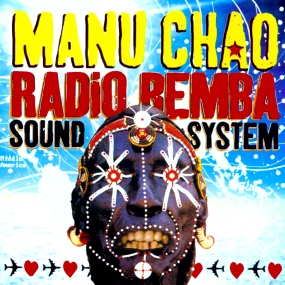
Radio Bemba Sound System is a live album by Manu Chao that was released in 2002. It is the accompanying CD to the performer's live DVD Babylonia en Guagua, filmed over two nights in 2001 during the tour for Proxima Estacion: Esperanza. Many of the songs found on Radio Bemba Sound System, such as "Machine Gun", "Peligro","Mala Vida","King Kong Five" and "The Monkey", are songs originally recorded by Manu Chao's previous band, Mano Negra. However the arrangements performed with Radio Bemba Sound System are more reggae-, ska-, and rock-oriented. The album is sequenced and edited in such a way that there is very little audience noise and cheering between the tracks, thus giving the impression of an all-night happy party - which calms down in the penultimate track only to explode again in the last one ("Promiscuity"); the cheering at the end of "Promiscuity" is cut short by a very early fade.

Les Wampas are a French punk rock/psychobilly band, who refer more exactly to their music as "Yé-yé-punk". The band was formed in Paris in 1983.
Desaparecido is a Spanish word that means disappeared. It may refer to:
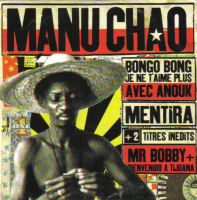
"Bongo Bong" is the first solo single by Manu Chao, from his debut album, Clandestino. It is a remake of "King of Bongo", a track from Manu Chao's previous band, Mano Negra. The title and lyrics are taken from the 1939 jazz song "King of Bongo Bong" by Black American trumpeter Roy Eldridge. It also uses the background music from Black Uhuru's song "Bull ina di Pen", from their 1984 album, Anthem. The song is part of a medley with "Je ne t'aime plus" on Clandestino. Moreover, the music has been reused for other songs, such as "Mr. Bobby", which was first released on this single before being re-recorded for Chao's second album, Próxima Estación: Esperanza, and "Homens", from the same record.
Birds of a feather flock together is an English proverb.
Pinocchio is the boy-puppet from the 1883 novel The Adventures of Pinocchio by Italian author Carlo Collodi.

La Radiolina is the fourth studio album by Manu Chao. It was released on 4 September 2007. Italy saw an advance release of the album on 30 August.
"Clandestino" is the second single and the title track from Manu Chao's first album, Clandestino. The lyrics of the song are sung in Spanish and deal with the issue of immigration: "I wrote it about the border between Europe and those coming from poorer nations. Look around — maybe 30% of the people in this street are clandestino [illegal]." The song peaked at number 78 on the French charts. It charted again in November 2013, peaking at number 196.
Despedida or La Despedida - the Spanish word meaning "Farewell" - may refer to:

Madjid Fahem is a French guitarist born in Paris in 1973. He has been a member of Manu Chao’s band Radio Bemba Sound System since 2000.
This page is based on this
Wikipedia article Text is available under the
CC BY-SA 4.0 license; additional terms may apply.
Images, videos and audio are available under their respective licenses.









